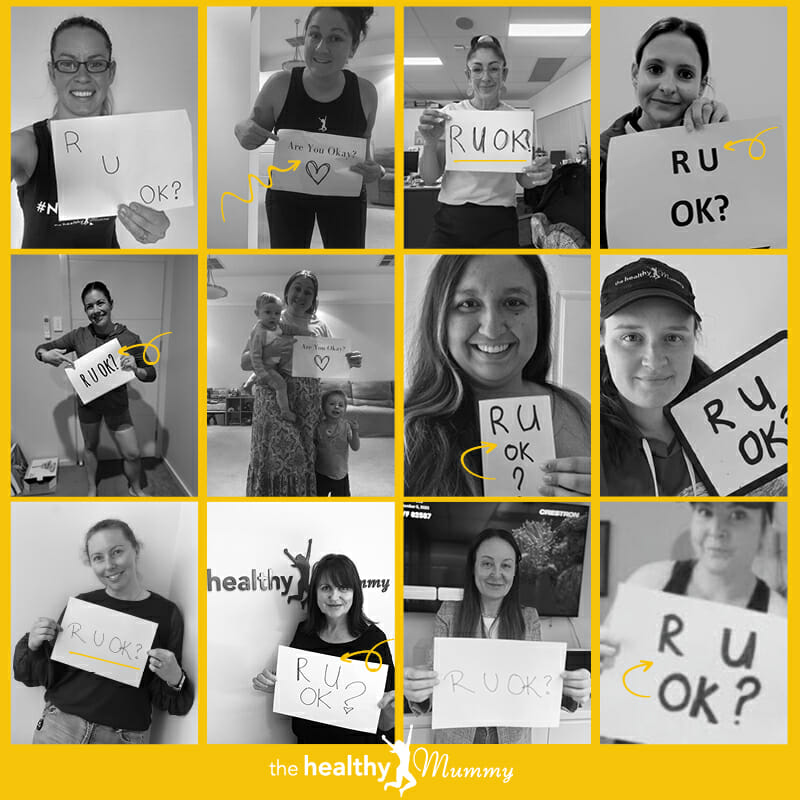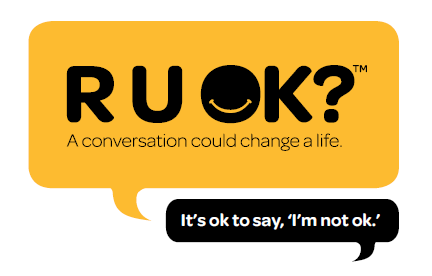R U OK? REALLY OK?!
R U OK Day is an annual day dedicated to remind people to ask family, friends and colleagues ‘R U OK?’
In our Healthy Mummy Community, we know all too well that mums can often feel overwhelmed but fail to really identify what’s wrong.
The challenging feelings that come with motherhood can then affect other areas of life including the relationship with your partner and friends or making time for physical and mental self-care.
The fact is being a mother some days feels like surviving instead of living. And that’s ok!
What’s also ok, is to know when to ask for help.
R U OK? REALLY OK?!
In Australia, it’s estimated that 45 percent of people will experience a mental health condition in their lifetime.
In any one year, around 1 million Australian adults have depression, and over 2 million have anxiety.
By inspiring people to take the time to ask “Are you OK?” and listen, we can help people struggling, long before they even think about suicide. It all comes down to regular, face-to-face, meaningful conversations about life. And asking “Are you OK?” is a great place to start.
Signs to look out for
Rachel Clements, the Director of Psychological Services at the Centre for Corporate Health (CFCH) and a member of the R U OK? Conversation Think Tank, explains the signs that someone may be at risk of suicide and how we can talk about this sensitive and important issue.
“The signs may be subtle, but it’s likely that you’ll pick up on a number of indicators that someone is struggling. As everyone is different and may respond differently to these thoughts and feelings, it’s important you trust your gut instinct when you notice a shift or change in someone and reach out to them,” Rachel said.
The non-verbal signs that indicate it’s time to reach out to someone include social withdrawal, a persistent drop in mood, disinterest in maintaining personal hygiene or appearance, uncharacteristically reckless behaviour, poor diet changes, rapid weight changes, being distracted, anger, insomnia, alcohol or drug abuse and giving away sentimental or expensive possessions.
Indirect verbal expressions include hopelessness, failing to see a future, believing they are a burden to others, saying they feel worthless or alone and talking about their death or wanting to die.
“People who have thought about suicide say the most important thing family, friends and colleagues can do is listen, show they care, and offer support,” says Rachel.
“There are three things to keep front of mind. Firstly, people who open up or disclose thoughts of suicide have often chosen that person very carefully. So, if someone opens up to you it’s an indication they trust you or see something in you that resonates with them and has enabled them to come forward.
“Secondly, if they’ve opened up it’s usually because they want help. They are already in the mindset of reaching out and wanting support, so it’s your role to be the vehicle that steers them in the right direction.
“Thirdly, it’s an invitation to step into a conversation with them, so don’t shut it down even if you’re uncomfortable,” she says.
If you think someone is at immediate risk call 000 and ask for an ambulance. Stay by their side whilst waiting for the ambulance to arrive.
Ask R U OK?
Do you know how the people in your world are really going? Life’s ups and downs happen to all of us. So chances are someone you know might be struggling. Your genuine support can make a difference whatever they are facing, big or small.
So, don’t wait until someone’s visibly distressed or in crisis. Make a moment meaningful and ask them how they’re really going.
Are they really OK? Ask them today.
R U OK? has developed FREE resources to help you encourage everyone in your school, workplace and community to think about who in their world might need to be asked how they’re really going and how to make a moment meaningful by asking “are you OK?
Click here to view RU OK’s resources.
Read more:
- R U OK? 4 mums talk about the importance of mental health
- The Healthy Mummy wants to know…R U OK?
- Tips to ask R U Ok? from our community to yours






